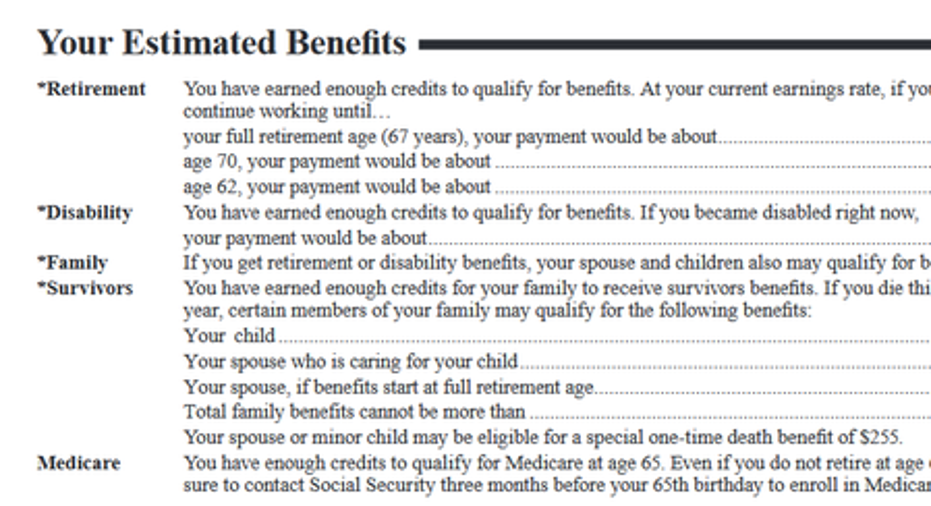What Benefits Do You Get From Social Security Disability?

If you become disabled and can no longer work, you may qualify for Social Security Disability Insurance (SSDI) based on your work record. Since SSDI benefits are based on your work record, they are generally comparable to what your Social Security retirement benefit would have been, had you worked until retirement age. Here's what you need to know about whether you qualify for SSDI and how to determine what your benefits could be.
Are you disabled?
The first step is to determine whether you qualify for disability benefits. As far as SSDI is concerned, disability benefits are paid to people who can't work because they have a medical condition that's expected to last at least a year or result in death.
The Social Security Administration uses a five-step process to determine if you're disabled.
- If you're working and earning more than a certain threshold each month, you're generally not considered to be disabled. However, it's important to note than many people can work and collect SSDI benefits simultaneously.
- Your medical condition must significantly limit your ability to do basic work activities (standing, walking, etc.) for at least a year.
- If the first two criteria are met, your medical condition is then compared to a list of impairments considered severe enough to prevent work. If it is, you have a qualifying disability.
- The SSA will decide if your disability prevents you from performing your work. For example, if you have a disability that prevents you from standing for long periods, and you work as a computer programmer and sit at a desk all day, your disability may not necessarily qualify for benefits.
- Finally, the SSA will determine if you're able and qualified to perform any other type of gainful work.
Does your work record qualify you for disability benefits?
Once you've established a qualifying disability, the other determining factor is whether or not you've worked enough to qualify for benefits. And, you'll need to pass two "tests."
- The recent work test depends on your age and takes into account how much you've worked in a certain time period prior to becoming disabled. For example, if you because disabled at age 31 or later, you can pass the recent work test if you worked during five years out of the 10-year period before becoming disabled.
- The duration of work test tells you how much you need to have worked altogether in order to qualify for SSDI benefits. This test is a sliding scale based on your age, ranging from 1.5 years of work needed if you become disabled before age 28 to 9.5 years if you become disabled at age 60.
How much are disability benefits?
Since SSDI benefits are based on your work record, they are generally comparable to your Social Security retirement benefit, had you been able to work until retirement. If you know your entire earnings history, you can input it into this calculator in order to get an estimate of what your disability benefit would be.
Better yet, the easiest way to get an idea of what your disability benefits could be, as well as whether or not you're eligible, is to create an account on www.ssa.gov and view your most recent Social Security statement. You can find this information, as well as lots of other useful information about other potential Social Security benefits to which you may be entitled.
Image source: Social Security Administration.
As you can see from the sample Social Security statement above, this individual has worked enough to qualify for disability benefits, and their projected monthly benefit of $1,596 is in the ballpark of their expected retirement benefit of $1,762.
The next steps
SSDI claims can take a while to process -- three to five months -- so it's important to apply as soon as possible. The easiest way is to apply online at www.ssa.gov, but you can also apply over the phone or in person at your local Social Security office.
In order to make the process go as quickly as possible, it helps to have certain information and documentation handy when you apply, including (but not limited to):
- Your Social Security number
- Contact information for doctors, hospitals, etc. relevant to your disability
- Information about any medications you take
- Any medical records in your possession
- Laboratory/test results
- Details of your previous work
- Your latest W-2 and tax return
The bottom line is that while nobody plans on becoming disabled, Social Security Disability Insurance can provide you with the peace of mind that you and your loved ones will be taken care of should anything happen to you.
The article What Benefits Do You Get From Social Security Disability? originally appeared on Fool.com.
Try any of our Foolish newsletter services free for 30 days. We Fools may not all hold the same opinions, but we all believe that considering a diverse range of insights makes us better investors. The Motley Fool has a disclosure policy.
Copyright 1995 - 2016 The Motley Fool, LLC. All rights reserved. The Motley Fool has a disclosure policy.



















